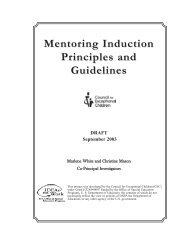What Every Must Know Special Educator - Council for Exceptional ...
What Every Must Know Special Educator - Council for Exceptional ...
What Every Must Know Special Educator - Council for Exceptional ...
You also want an ePaper? Increase the reach of your titles
YUMPU automatically turns print PDFs into web optimized ePapers that Google loves.
must support inclusion in the educational re<strong>for</strong>ms<br />
they espouse. Further, the policy makers should fund<br />
programs in nutrition, early intervention, health care,<br />
parent education, and other social support programs<br />
that prepare all children, youth, and young adults to<br />
do well in school. There can be no meaningful school<br />
re<strong>for</strong>m, nor inclusive schools, without funding of<br />
these key prerequisites. As important, there must be<br />
interagency agreements and collaboration with local<br />
governments and business to help prepare students to<br />
assume a constructive role in an inclusive community.<br />
Professional Development. And finally, state/provincial<br />
departments of education, local educational<br />
districts, and colleges and universities must provide<br />
high-quality preservice and continuing professional<br />
development experiences that prepare all general<br />
educators to work effectively with children, youth,<br />
and young adults representing a wide range of abilities<br />
and disabilities, experiences, cultural and linguistic<br />
backgrounds, attitudes, and expectations. Moreover,<br />
special educators should be trained with an emphasis<br />
on their roles in inclusive schools and community<br />
settings. They also must learn the importance of establishing<br />
ambitious goals <strong>for</strong> their students and of<br />
using appropriate means of monitoring the progress<br />
of children, youth, and young adults.<br />
Paragraph 7 - Staff Preparation<br />
<strong>for</strong> Placement<br />
Essential to the appropriate placement of the child<br />
with an exceptionality is the preparation of the environment<br />
<strong>for</strong> that child through preservice and/or<br />
inservice training of staff and any other necessary<br />
accommodations.<br />
Teacher training institutions are challenged to instruct<br />
all teacher candidates about current trends in the education<br />
of exceptional children.<br />
State and provincial departments of education are<br />
charged with the responsibility to promote inservice<br />
activities that will update all professional educators<br />
and provide ongoing, meaningful staff development<br />
programs.<br />
Administrators can have a significant positive influence<br />
upon the professional lives of teaching staff and,<br />
there<strong>for</strong>e, upon the educational lives of children.<br />
Administrative personnel of school districts are,<br />
there<strong>for</strong>e, charged with the responsibility to promote<br />
inservice education and interprofessional exchanges<br />
which openly confront contemporary issues in the<br />
education of all children.<br />
256 whAt every SpeCiAl eduCAtor muSt <strong>Know</strong><br />
Paragraph 8 - Individualized<br />
Education Programs<br />
The creation and operation of a series of alternative<br />
settings <strong>for</strong> exceptional persons to live their lives and<br />
to develop to the greatest degree possible requires that<br />
service providers continuously strive to deliver the<br />
highest quality services possible. The <strong>Council</strong> believes<br />
that the central element <strong>for</strong> the delivery of all the services<br />
required by a person with an exceptionality must<br />
be an individually designed program. Such a program<br />
must contain the objectives to be attained, resources to<br />
be allocated, evaluation procedures and time schedule<br />
to be employed, and a termination date <strong>for</strong> ending<br />
the program and procedure <strong>for</strong> developing a new<br />
one. The process <strong>for</strong> developing an individualized<br />
program must adhere to all the procedural safeguards<br />
of due process of law and must involve the individual<br />
person and his or her family, surrogate, advocate, or<br />
legal representative.<br />
Paragraph 9 - Due Process Protections<br />
(Procedural Safeguards)<br />
As a final component of quality control, The <strong>Council</strong><br />
believes that no decisions can be made on behalf of any<br />
individual without strict adherence to due process of<br />
law. Most significant is our position that all individuals<br />
are entitled to adequate representation when such<br />
decisions are being made. We support the increasing<br />
ef<strong>for</strong>ts on the part of governments to officially require<br />
the assignment of a surrogate when a family member<br />
is not available <strong>for</strong> purposes of adequately representing<br />
the interests of the person with an exceptionality.<br />
Ultimately, however, whenever possible, a member<br />
of the individual’s family provides the most desirable<br />
representation. It is also our position that the<br />
individual consumer must be given every opportunity<br />
to make his or her own decisions, that this is a right<br />
provided to all citizens, and that any abridgement of<br />
that individual right can only occur upon the proper<br />
exercise of law.<br />
Paragraph 10 - Confidentiality<br />
The <strong>Council</strong> <strong>for</strong> <strong>Exceptional</strong> Children urges members<br />
to adhere to ethical principles and act in compliance<br />
with laws and regulations which protect children and<br />
their family’s right to privacy and which control the<br />
use of confidential in<strong>for</strong>mation regarding children.<br />
Paragraph 11 - Program Evaluation<br />
Programs designed <strong>for</strong> the purpose of providing<br />
educational opportunities <strong>for</strong> children and youth with<br />
exceptionalities must not be viewed as static, <strong>for</strong> the









